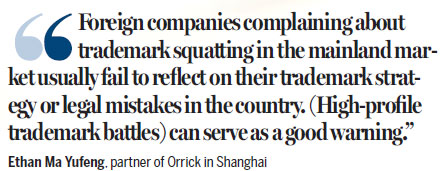Making a mark is no small matter
Updated: 2015-07-31 08:50
By Luo Weiteng(HK Edition)
|
|||||||||
The specter of costly branding litigation and payouts sparked by rampant 'squatting' on the Chinese mainland is forcing smaller overseas firms to rethink strategy or even consider packing up. Luo Weiteng reports.
Hatley Little Blue House Inc, a Canada-based gift and apparel retailer/wholesaler brand best known for its raincoats, has been stranded at the doorstep of the Chinese mainland market for more than a year.
Hatley, which falls under the small- and medium-sized enterprise (SME) category, is like many of its foreign counterparts suffering from a trademark hurdle on the mainland that has threatened to scupper its plans to enter the world's second-largest economy.
The process has proved so troublesome that it now just wants to pull out and head home. And that is just one of the several trademark battles to have come into the spotlight in the mainland market lately.
Its trademark fight puts Hatley Little Blue House in the same boat as US giants New Balance and Tesla Motors, and Australia's Treasury Wine Estates, owners of the Penfolds brand, as they face roadblocks with their brands on the mainland.
And it is not just companies, US basketball legend Michael Jordan this week lost a trademark lawsuit in Beijing against Qiaodan Sports over its use of a name and images similar to those of his Jordan brand with Nike.
However, unlike large corporations whose trademark disputes can easily grab headlines and which enjoy greater financial power and leverage, small- and medium-sized companies bruised by the trademark wrangle are much more likely to be scared off.
In June last year, with high hopes for the lucrative business opportunities on the mainland, Hatley Little Blue House applied to register the "Hatley" trademark, only to find it had already been registered by a Guangdong-based firm for apparel-related use, including raincoats.
The prior registrant, a local shoemaker, turned out to have no raincoat-related business. It claimed the trademark was just registered for friends.
Besides "Hatley", the pirate registered as many as 60 other trademarks years ago, mostly names of small and medium apparel-related firms based in the US, Europe and Australia, according to Joseph Simone, an intellectual property (IP) consultant representing Hatley Little Blue House.
The Canadian raincoat maker tried to reach the local shoe manufacturer by phone to buy up the trademark last July, with its offer doubled from $10,000 to $20,000. Yet calls were abruptly cut off twice by the early registrant.
Hatley, together with Simone, managed to meet the local shoemaker's agent early this June in Yiwu, Zhejiang province, the world's largest market for wholesale and small-scale commodities. However, the parties failed to reach a settlement, and Simone does not think they can expect to resolve the dispute very soon.
The latest spate of trademark tangles somewhat originates from the difference between the "first to file" and "first to use" principles, said Ethan Ma Yufeng, partner at global law firm Orrick's Shanghai office.
Point of principle
According to the "first to file" principle, seen in most jurisdictions including the Chinese mainland, the earliest applicant enjoys the first priority. In the case of trademark application, specifically, the right is deemed to be first generated on the date of application.
Under the "first to use" principle adopted by countries like the US and Canada, however, the lawful rights to trademarks are generally based on use instead of order of registration.
Yet, the "first to use" principle shall not be considered as denying the rights of prior applicants, noted Ma. Under the US' Lanham Act, trademark applications are also considered constructive uses of such marks.
Foreign companies stepping into the mainland market with the preconceived mentality of "first to use" usually fail to think too much about trademark registration there.
When they started their businesses in the western hemisphere years ago, the mainland market was seldom on the minds of these firms, leave alone trademark applications on the Chinese mainland, Ma pointed out.
The "first to file" principle, however, incentivizes "squatters", who target valuable foreign brands by filing for them but have no intention to use them in a bona fide manner, said Simone, who is also the Hong Kong-based director and founder of Simone IP Services, an IP consulting and trademark agent in Greater China.
Simone refers to these sorts of scams as "flypaper", with the pirate filing and waiting for the victim companies to approach them for a purchased assignment. In some cases, such as that faced by Hatley, the pirate will record their trademark registrations with the Chinese customs department and hope they seize shipments of authentic goods on their way from mainland factories to overseas customers.
Firms in such dire straits are usually left with three options. They can change the brand they use on the mainland, fight long and expensive legal battles with the pirates, or just offer the pirate a substantial amount of money for a transfer of the rights, added Simone. Very often, victim brands are forced to give pirates significant compensation to buy the mark, out of fear that the pirate will otherwise disrupt production and sales on the mainland and force the company into costly and lengthy legal battles, the outcome of which may be uncertain.
Simone notes that trademark pirates, also known as "trolls", are fully aware of these considerations, and rely on them when quoting a price for sale of the mark.
How a trademark dispute will end largely depends on how big the victim company is, observed Edward Chatterton, Hong Kong-based partner at multinational law firm DLA Piper. Chatterton believes that large and famous companies can usually most afford to change or buy the relevant mark.
Cases in point include Apple, which paid $60 million in 2012 to settle a two-year-old dispute over the iPad trademark with Shenzhen Proview Technology.
Electric carmaker Tesla got off much more lightly, resolving a long-running trademark dispute last August with Chinese businessman Zhan Baosheng, who agreed to allow the government to cancel his trademarks at no cost to the Silicon Valley firm.
But overseas SMEs in a branding rights tussle may have a more uphill battle in many parts of the world.
Costly question
As trademark rights are generally geographic in scope, companies are required to do trademark clearance search and registration in any market they gear up to enter. This, however, may amount to a big expense for cash-starved overseas SMEs, noted Chatterton, citing a small beverage brand, 50 percent of whose funding, or nearly $25,000, was spent on trademark registration in several foreign markets.
Such an investment always proves to be rewarding and the earlier it is done the better. But the problem is that there is not much capital left for the beverage brand to invest in its business, said Chatterton.
Cash-strapped SMEs in a similar dilemma between investing in trademarks or their core business may be forced to set aside brand registration in foreign markets before their brands became famous and business grows big enough. But this opens the doors for pirates to cash in on the success of their business, Chatterton pointed out.
A lack of funding may be a good excuse for trademark registration in foreign markets making way for business growth at the early stage.
But Simone suggests that overseas companies see the mainland as home territory, rather than a typical "foreign market", given that most companies are making products on the mainland for export elsewhere.
Even though SMEs may not have expansion plans on the mainland in the short or medium term, the market there is booming, with e-commerce offering a convenient way to start distribution quickly and at a low cost. This and the risk of piracy make it all the more important to file trademark applications on the mainland as early as possible, Simone said.
"Foreign companies complaining about trademark squatting in the mainland market usually fail to reflect on their trademark strategy or legal mistakes in the country," observed Ma at Orrick.
High-profile trademark battles, he noted, will generally not make western brands balk at entering the mainland. "But it can serve as a good warning for foreign companies to follow the rules of the game in the mainland market."
Contact the writer at sophia@chinadailyhk.com



(HK Edition 07/31/2015 page9)